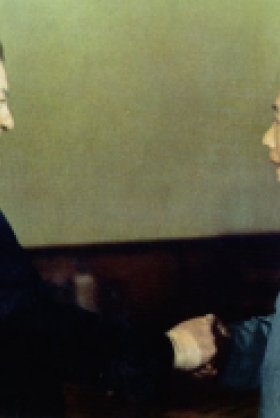Sino-West German Relations during the Mao Era



CWIHP e-Dossier No. 56
Sino-West German Relations during the Mao Era
Bernd Schaefer
For more than twenty years, the Federal Republic of Germany (FRG, or West Germany), founded in May 1949, held no ambitions to establish diplomatic relations with the People’s Republic of China (PRC). The socialist PRC’s German partner was its ideological ally GDR (German Democratic Republic), which it shared the same month of self-proclamation with (October 1949). West Germany pursued economic and rather limited political ties with the Republic of China (ROC) in Taiwan. However, the FRG did never officially recognize the ROC in order not to counter its own policy concepts of German unification. The FRG refrained from officially recognizing German division, and it never forfeited the claim of continuous existence of a “German nation” encompassing both German states. Such thinking was actually not too far from the “One China” concept propagated by Beijing (and at times by Taipei as well).
China’s propagandistic call to the FRG in 1955 to establish diplomatic relations was a transparent attempt to seize on West Germany’s establishment of relations with the Soviet Union that year. Actually, for a long time Moscow was the only capital in the world that hosted embassies of both GDR and FRG. This was an exception Bonn was willing to undertake in order to accept the Soviet Union as one of the four victors of World War II and, in this capacity, one of four potential guarantors of any future potential German unification. China was far from any comparable relevance to the FRG. Consequently, West Germany ignored the calls from Beijing during the mid-1950s.
The first serious exploration of potential establishment of official Sino-West German was not undertaken until 1964. Then the French recognition of Beijing and exchange of ambassadors also resulted in some tentative low-level meetings between representatives from FRG and PRC in Geneva. Talks were suspended, however, without any tangible results before China entered into the domestic turmoil and international “time-out” of the “Great Proletarian Cultural Revolution”.
One consequence of the Cultural Revolution was the 1969 Sino-Soviet border clashes. They intrigued some conservative forces in West Germany and ignited a low-key debate about whether the FRG should establish official relations with the PRC. While Chancellor Kurt Georg Kiesinger still thought of China in terms of “yellow peril” stereotypes, his Finance Minister Franz Josef Strauss wanted to exploit the Sino-Soviet conflict for anti-communist policies and argued for relations with China to challenge and poke the Soviet Union.
However, in fall of 1969 a new coalition of Social Democrats and Liberals under Chancellor Willy Brandt began to pursue an Ostpolitik of normalizing relations with Moscow and the Soviet bloc in Eastern Europe. During the process of negotiating and signing treaties with the USSR, Poland, and the GDR, plus working towards their ratification by the West German parliament, the Brandt government was extremely eager not to cross the Soviet Union. Thus any normalization talks with China, then Moscow’s enemy, were pushed to the back burner.
Only when the Bonn parliament ratified the “Eastern Treaties” and Brandt had survived a no-confidence vote by May 1972, the FRG government initiated a China trip by opposition politician Gerhard Schröder. In his capacity as Chairman of the parliament’s Foreign Relations Committee, Schröder explored in July of 1972 with Prime Minister Zhou Enlai and the PRC’s deputy foreign ministers the possibility of opening diplomatic relations between Bonn and Beijing. Returning to the West German capital with a report on China’s explicit interest, Schröder’s visit then allowed Chancellor Brandt to inform General Secretary Leonid Brezhnev about West Germany’s upcoming normalization of relations with the PRC. Foreign Minister Walter Scheel traveled to Beijing in October 1972 to sign the documents and had his own meeting with Zhou Enlai. There the Chinese premier sided with Bonn’s interpretation of one indivisible (German) nation existing in two states, thus countering the official East German viewpoint of two separate socialist resp. ‘capitalist-imperialist’ German nations.
The Chinese embrace of the West German concept of nation, expressed at various bilateral meetings and occasions throughout the 1970s, was a blow to GDR ambitions to claim its own sovereign German nation. During remaining years of Mao’s reign after 1972, East German-Chinese relations fell to their lowest point. Meanwhile, driven by the twists and turns of Mao’s ideology and the Chairman’s thesis about an inevitable Soviet attack on Western Europe, the PRC reached out to anti-Soviet conservative forces across Europe. In the West German case, this resulted in the invitation of opposition leaders Helmut Kohl and Franz-Josef Strauss to China. The latter’s visit in January/February 1975, where the Bavarian politician became the first West German to meet Chairman Mao, turned into a spectacular display of Chinese support for representatives of the “intermediate zone.” Strauss, being fervently anti-Soviet and skeptical of American reliability to defend Western Europe, hit a nerve with his Chinese hosts and enjoyed a symmetry of ideas like no other Western politician at the time.
Nonetheless, Strauss’ domestic opponent, Chancellor Helmut Schmidt, also succeeded in securing a meeting with Chairman Mao in October 1975. Chinese hopes for a conservative electoral victory in West Germany in 1976 were to remain unfulfilled. Continuing FRG detente policy with the Soviet Union, Schmidt was, however, both cognizant and appreciative of China’s future weight and potential. He pragmatically engaged the PRC and post-Maoist leader Denk Xiaoping whom he had also met during his 1975 visit to China. Strauss played a similar role when he capitalized on his reputation in China from his own 1975 Mao and Deng meetings. Major Bavarian companies became the avant-garde of West German industry to invest and ultimately produce in China. Personalized diplomacy by those two quite different German “Friends of China” paved the way for a steady expansion of what has become the core of German-Chinese relations ever since: investments, technology transfer, production, exports, trade, and healthy sales.
Bernd Schaefer is a Senior Scholar with the Wilson Center’s Cold War International History Project (CWIHP) and a Professorial Lecturer at George Washington University. He is currently completing a book East Asian Communism and the Superpowers, 1968-1976 for publication. He was a Visiting Professor with East China Normal University in Shanghai, Pannasastra University in Phnom Penh, and the University of North Korean Studies in Seoul; and also a Fellow at the Nobel Institute in Oslo, the University of Malaysia in Kuala Lumpur, and a Research Fellow with the German Historical Institute in Washington D.C. and the Technical University of Dresden. He holds a Ph.D. from the University of Halle in Germany, a MPA from the Harvard Kennedy School, and a B.A. from the University of Tübingen. His recent publications include 1965 - Indonesia and the World (Gramedia, Jakarta 2013), The East German State and the Catholic Church, 1945-1989 (Berghahn Books, New York 2010) and Ostpolitik, 1969-1974: Global and European Responses (Cambridge University Press, New York 2009; ed. with Carole Fink).
List of Documents
Document No. 1
Memorandum from Department Head Egon Bahr, 'Establishment of Relations with the Communist States in Asia,' 18 December 1968
[Source: Institut für Zeitgeschichte, ed., Akten zur auswärtigen Politik der Bundesrepublik Deutschland: Juli bis 31. Dezember 1968 (München: Oldenbourg, 1999), 1613-1617. Translated by Bernd Schaefer.]
Document No. 2
Note from Department Head Ruete, 'Meeting with the Bonn Xinhua Representative on June 13, 1969,' 23 June 1969
[Source: Institut für Zeitgeschichte, ed., Akten zur auswärtigen Politik der Bundesrepublik Deutschland: Januar bis 30. Juni 1969 (München: Oldenbourg, 2000), 720-723. Translated by Bernd Schaefer.]
Document No. 3
Memorandum from Department Head Oncken, 'Establishment of Relations with the People's Republic of China and Albania,' 20 November 1970
[Source: Institut für Zeitgeschichte, ed., Akten zur auswärtigen Politik der Bundesrepublik Deutschland: 1. .Januar bis 30. April 1970 (München: Oldenbourg, 2001), 2089-2091. Translated for CWIHP by Bernd Schaefer.]
Document No. 4
Note from State Secretary Freiherr von Braun, 'Meeting of MP Dr. Schröder with Mr. Foreign Minister in Hinterthal on July 30, 1972,' 2 August 1972
[Source: Institut für Zeitgeschichte, ed., Akten zur auswärtigen Politik der Bundesrepublik Deutschland: 1. Juni bis 30. September 1972 (München: Oldenbourg, 2003). Translated by Bernd Schaefer.]
Document No. 5
Ambassador Pauls, Washington, to Foreign Office, 'German China Policy,' 7 August 1972
[Source: Institut für Zeitgeschichte, ed., Akten zur auswärtigen Politik der Bundesrepublik Deutschland 1972. 1. Juni bis 30. September 1972 (München: Oldenbourg, 2003), 1021-1023. Translated by Bernd Schaefer.]
Document No. 6
Department Head van Well to Foreign Office, 'China Visit by Mr. Foreign Minister,' 12 October 1972
[Source: Institut für Zeitgeschichte, ed., Akten zur auswärtigen Politik der Bundesrepublik Deutschland 1972. 1. Oktober bis 31. Dezember 1972 (München: Oldenbourg, 2003), 1527-1529. Translated for CWIHP by Bernd Schaefer.]
Document No. 7
Telex from Department Head van Well, 'China Visit by Mr. Foreign Minister,' 13 October 1972
[Source: Institut für Zeitgeschichte, ed., Akten zur auswärtigen Politik der Bundesrepublik Deutschland: 1972. 3, 1. Oktober bis 31. Dezember 1972 (München: Oldenbourg, 2003), 1532-1534. Translated by Bernd Schaefer.]
Document No. 8
Telex from Ambassador Pauls, 6 June 1973
[Source: Institut für Zeitgeschichte, ed., Akten zur auswärtigen Politik der Bundesrepublik Deutschland: 1973. 1. Mai bis 30. September 1973 (München: Oldenbourg, 2004). Translated by Bernd Schaefer.]
Document No. 9
Cable from Ambassador Pauls to the Foreign Office, 24 November 1973
[Source: Institut für Zeitgeschichte, ed., Akten zur auswärtigen Politik der Bundesrepublik Deutschland: 1973. 1. Oktober bis 31. Dezember 1973. (München: Oldenbourg, 2004). Translated by Bernd Schaefer.]
Document No. 10
Cable from Ambassador Pauls to the Foreign Office, 'China – Federal Republic,' 14 June 1974
[Source: Institut für Zeitgeschichte, ed., Akten zur auswärtigen Politik der Bundesrepublik Deutschland: 1974 1. Januar bis 30. Juni 1974.. (München: Oldenbourg, 2005). Translated by Bernd Schaefer.]
Document No. 11
Cable from Ambassador Pauls to the Foreign Office, 'German-Chinese Relations,' 19 June 1975
[Source: Institut für Zeitgeschichte, ed., Akten zur auswärtigen Politik der Bundesrepublik Deutschland: 1975. 1. Januar bis 30. Juni 1975 (München: Oldenbourg, 2006). Translated by Bernd Schaefer.]
Document No. 12
Conversation between Federal Chancellor Schmidt and the Chairman of the Central Committee and the Politburo of the Chinese Communist Party, Mao Zedong, in Beijing, 30 October 1975
[Source: Institut für Zeitgeschichte, ed., Akten zur auswärtigen Politik der Bundesrepublik Deutschland: 1975. 1. Juli bis 31. Dezember 1975 (München: Oldenbourg, 2006), 1495-1500. Translated by Bernd Schaefer.]
Document No. 13
Conversation between Federal Chancellor Schmidt and Chinese Deputy Prime Minister Deng Xiaoping in Beijing, 31 October 1975
[Source: Institut für Zeitgeschichte, ed., Akten zur auswärtigen Politik der Bundesrepublik Deutschland: 1975. 1. Juli bis 31. Dezember 1975 (München: Oldenbourg, 2006), 1514-1519. Translated by Bernd Schaefer.]
Document No. 14
Conversation between Foreign Minister Genscher and Chinese Ambassador Wang Shu, 26 August 1976
[Source: Institut für Zeitgeschichte, ed., Akten zur auswärtigen Politik der Bundesrepublik Deutschland: 1975. 1. Juli bis 31. Dezember 1976 (München: Oldenbourg, 2007), 504-509. Translated by Bernd Schaefer.]
Document No. 15
Cable from Ambassador Wickert to the Foreign Office, 'Benefits of Relationship with China for the Alliance,' 29 November 1976
[Source: Institut für Zeitgeschichte, ed., Akten zur auswärtigen Politik der Bundesrepublik Deutschland: 1975. 1. Juli bis 31. Dezember 1976 (München: Oldenbourg, 2007), 1553-1556. Translated by Bernd Schaefer.]
Author

Professional Lecturer, The George Washington University

Cold War International History Project
The Cold War International History Project supports the full and prompt release of historical materials by governments on all sides of the Cold War. Read more


History and Public Policy Program
A leader in making key foreign policy records accessible and fostering informed scholarship, analysis, and discussion on international affairs, past and present. Read more

Explore More
Browse Insights & Analysis
A “Diplomatic Nuclear Explosion”? Sino-French Relations in the 1960s


